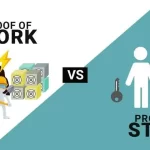
Introduction
Have you ever wondered how many crypto blockchains exist in the ever-expanding digital landscape? As I ventured into the world of cryptocurrencies, I was captivated by the sheer diversity of blockchain networks. From public blockchains like Bitcoin and Ethereum that offer transparency and security to private and consortium blockchains tailored for specific industries, the options seem endless. While an exact count is challenging due to the constant evolution of this technology, thousands of blockchains are revolutionizing industries and empowering individuals worldwide. Join me as we unravel the intriguing realm of crypto blockchains and unlock their immense potential.
Related suggestion for you: What is Crypto Mining GPU
Content
Types of Crypto Blockchains

When it comes to crypto blockchains, there is an incredible variety to explore. Let’s dive into the different types of blockchains and understand their unique features and applications.
1. Public Blockchains
Decentralization at its Core Public blockchains, like Bitcoin and Ethereum, are open to anyone and operate on a decentralized network. These blockchains rely on a consensus mechanism, such as Proof-of-Work, to validate transactions. They offer transparency, security, and immutability, making them suitable for cryptocurrencies and decentralized applications (DApps).
2. Private Blockchains
Restrictive Yet Efficient Private blockchains, as the name suggests, are accessible only to authorized participants. These blockchains are often used within organizations, allowing for controlled access and greater efficiency. In industries like supply chain management or finance, private blockchains enable faster transactions while maintaining data privacy and integrity.
3. Consortium/Permissioned Blockchains
Collaboration with Controlled Access Consortium or permissioned blockchains strikes a balance between public and private blockchains. They are governed by a group of organizations rather than a single entity. Consortium blockchains allow for controlled access while maintaining transparency and consensus among trusted participants. This type of blockchain finds application in sectors such as healthcare, where multiple entities must collaborate while safeguarding sensitive data.
4. Hybrid Blockchains
The Best of Both Worlds Hybrid blockchains combines the features of public and private blockchains. They offer flexibility by allowing certain aspects to be public while keeping other components private. For instance, a hybrid blockchain may store transaction data publicly while keeping participants’ identities confidential. This type of blockchain can cater to various use cases, including finance, supply chain, and identity verification.
5. Cross-Chain Interoperability
Bridging the Gap Cross-chain interoperability is a crucial aspect of blockchain technology. It refers to the ability of different blockchains to communicate and share data seamlessly. Projects like Polkadot and Cosmos are working on protocols that enable interoperability between blockchains, fostering collaboration and expanding the potential of decentralized ecosystems.
6. Tokenization and Smart Contracts
Unlocking Possibilities Tokenization involves representing real-world assets or functionalities as digital tokens on a blockchain. It allows for fractional ownership, increased liquidity, and new investment opportunities. Smart contracts, programmable self-executing contracts, enable automation and remove intermediaries in various processes, from insurance claims to supply chain tracking.
Embracing Blockchain Diversity As we explore the diverse landscape of crypto blockchains, we witness their immense potential and transformative power. Each type of blockchain caters to specific needs, and their combined impact is shaping industries across the globe. Embracing blockchain diversity enables innovation, transparency, and decentralized solutions that can revolutionize our digital world.
How Many Crypto Blockchains Exist?

Have you ever wondered just how many crypto blockchains exist? Join me on this exciting journey as we explore the vast array of blockchain networks and their significance in the digital realm.
1. Unraveling the Complexity
Determining the exact number of crypto blockchains can be challenging due to the constantly evolving nature of the blockchain landscape. New blockchains regularly emerge, catering to specific industries, use cases, or technological advancements.
While it is impossible to provide an exact count, the growth of blockchain technology is exponential. Thousands of blockchains are actively serving diverse needs, revolutionizing industries such as finance, supply chain, healthcare, and more.
2. Embracing the Potential
The increasing number of crypto blockchains is a testament to the widespread adoption and recognition of the technology’s potential. Each blockchain offers unique solutions, empowering individuals and businesses to redefine processes, enhance security, and foster innovation.
The world of crypto blockchains is a vibrant and dynamic ecosystem, with countless options available to suit various requirements. By exploring the different types of blockchains, we can appreciate their strengths and contribute to the exciting future of decentralized technology.
Recommended for you: How to start a Crypto Mining Business
Conclusion
In my journey to explore the vast world of crypto blockchains, I have discovered that their numbers are ever-growing and diverse. While it’s challenging to pinpoint an exact count due to the constant evolution of this technology, one thing is clear: the potential of crypto blockchains is limitless. These decentralized networks, whether public, private, consortium, or hybrid, are reshaping industries and revolutionizing how we transact and collaborate. As I bid farewell to this exploration, I am filled with excitement for the future of crypto blockchains and the transformative impact they will continue to have on our digital world.
u003cstrongu003eWhy is it challenging to determine the exact number of crypto blockchains?u003c/strongu003e
The blockchain landscape is continuously evolving, with new blockchains being created and existing ones undergoing updates. Additionally, the decentralized nature of blockchains makes it difficult to track every network and its variations accurately.
u003cstrongu003eHow can I stay updated on the latest crypto blockchains?u003c/strongu003e
To stay informed about the expanding blockchain ecosystem, you can follow reputable cryptocurrency news sources, subscribe to blockchain-specific forums and communities, and explore blockchain-related websites and blogs. These platforms provide insights into new blockchain projects and emerging technologies.
u003cstrongu003eAre there tools available to discover and track crypto blockchains?u003c/strongu003e
Yes, several blockchain explorers and databases exist that allow you to explore and monitor different blockchains. These tools provide information about blockchain networks, their transaction history, block details, and token information. Examples include Etherscan for Ethereum and Blockchain for multiple blockchains.
u003cstrongu003eHow can I differentiate between genuine blockchains and mere token projects?u003c/strongu003e
While the crypto space is filled with various projects, not all are independent blockchains. Some projects are built on existing blockchains as tokens or smart contracts. To differentiate, look for projects with consensus mechanisms, unique blockchain addresses, and native tokens or cryptocurrencies.
u003cstrongu003eCan I contribute to the development of a new blockchain?u003c/strongu003e
Yes, blockchain technology encourages community participation and open-source collaboration. If you have programming skills or domain expertise, you can contribute to blockchain projects by joining their development teams, contributing code, participating in discussions, or providing feedback and suggestions. Open-source blockchain platforms like Ethereum and Cardano offer avenues for community involvement.

Bryan Lester a crypto blog author. He has been investing in Bitcoin since 2024, and have made a lot of money from it. His favorite things are reading books about the future, talking to people who want to know more about cryptocurrency, and just being around family.



